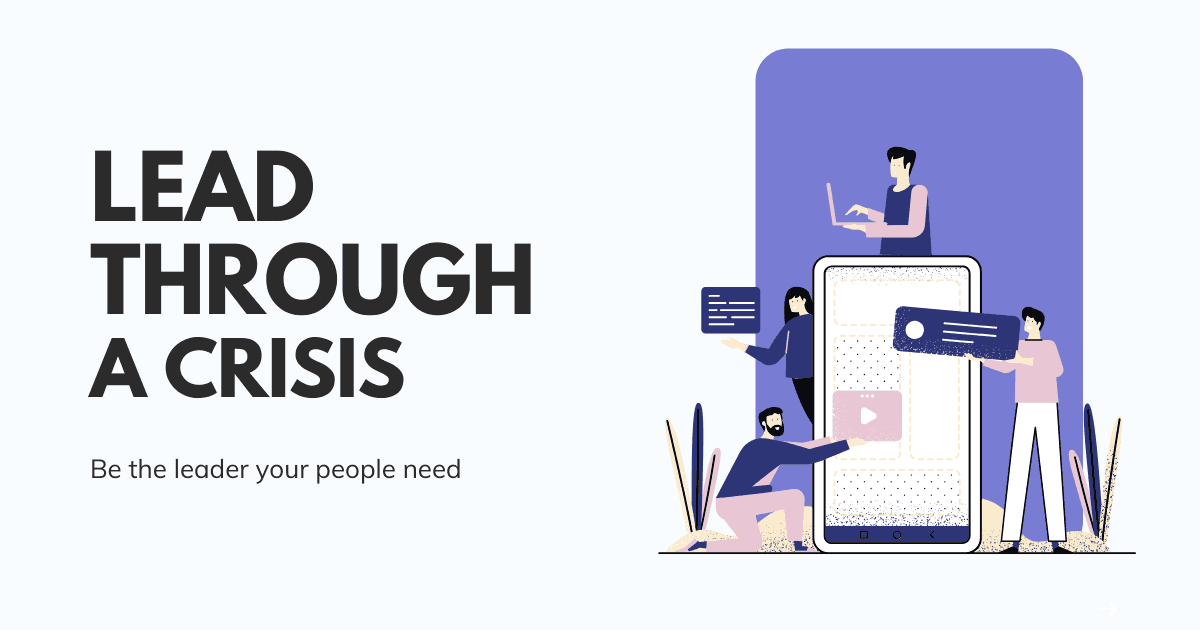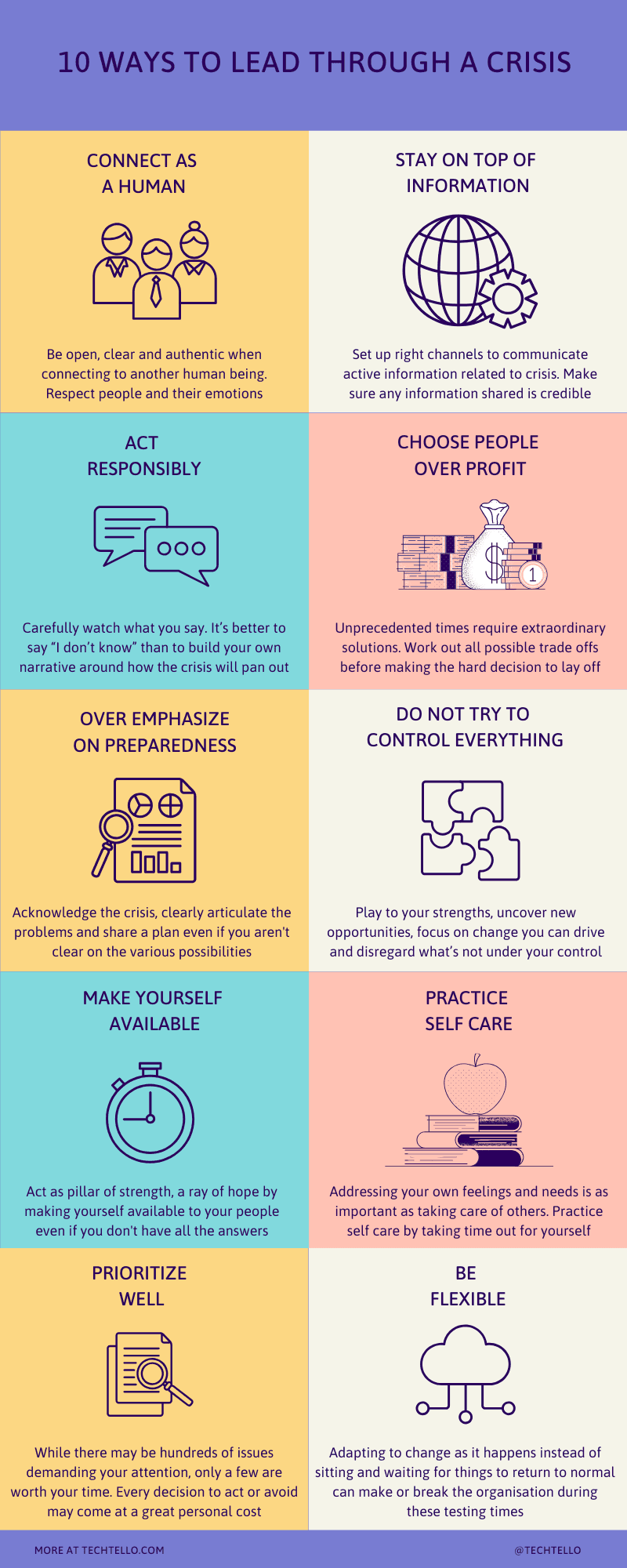10 Ways To Lead Through A Crisis

In times of uncertainty when there’s little clarity on how the events will unfold, fear and worry of the unknown can consume us. Risk of business and personal lives in such surreal circumstances can cause feelings of fear, helplessness, anger and stress. Learning to lead through a crisis like covid-19 will require people to step up in their roles and lead others through unsettling and uncertain times.
What’s more important now than ever is to navigate this unchartered territory together even when we are unsure, feel discouraged, lonely or there’s fear of what may come. It’s times like these that will bring many leaders to the fore who will lead their organisations by planning for future contingencies, what may likely happen while also addressing the current needs, what must happen now in the present.
The situation may get noisy with few facts and many opinions. When it’s difficult to find information that you can trust and apply, ambiguity from leaders can cause more confusion on which direction to take.
What organisations need now is resiliency in a time of crisis by acknowledging the problems and uniting everyone in a common effort to fight this together.
Inspired by Jeff Immelt, ex-CEO, GE – “Don’t retreat, or hide, or wait for a return to normal. This is a time to lead”
10 important steps to lead through a crisis
It’s easy to act like we always do and make assumptions about the future, but only a true leader knows that a real crisis requires unreal solutions by breaking the barriers to what’s possible, accepting the unknowns and devising ways to lead through the crisis.
Unprecedented times require leaders to make tough choices, decide without clarity and complete information and provide a plan to their employees even when they know it will change.
The plan may fail, it may require constant iterations every day and week. However, the simple act of sharing it reduces anxiety, builds trust, establishes credibility and provides its people with a direction.
The cost of ignoring important information and not acting in the right ways at the right time can have severe consequences for businesses and its people.
To lead through a crisis, follow these 10 steps:
1. Connect as a human

Be open, clear and authentic when connecting to another human being. Respect people and their emotions – feeling of fear during a crisis is real.
Organisations should encourage leaders to give mental health a priority by engaging with people beyond work and showing genuine concern for their well being. They can also set up dedicated volunteer groups who can serve as the support structure for those in need by helping answer any queries, provide direction or simply be there to hear them out.
As a leader, instead of focusing on what feels right to you, actively listen to understand what’s most important to people right now and address that need. Do not dodge off any concern as less important. You may not have all the answers, but by simply listening you can act as a big support to their emotional needs.
Leaders who accept vulnerability by sharing their own personal story on how they are dealing with the crisis develop respect and trust from their people. Once employees feel connected, heard, cared for and understood, they will do their best to support the organisation and its people.
2. Stay on top of information
Every crisis comes with information overload. For an individual, simply keeping track of the latest developments while avoiding fake news can feel quite draining and overwhelming.
Organisations can play an active role in providing important information to its employees by establishing communication guidelines. Keep your employees apprised of the situation by:
- Setting up right channels to communicate active information related to crisis
- Make sure any information shared is credible
- Provide helpline numbers from reliable sources
- Encourage employees to refrain from sharing crisis related news and social media forwards within the organisation to avoid panic
As a leader, acknowledge the uncertainty, that you don’t have all the answers, what you say today may be irrelevant tomorrow as the new information unfolds, but do not sit on the information. Delivering the message even if you aren’t clear on the various possibilities is important to reduce anxiety and build credibility.
3. Act Responsibly
In his book Your Brain At Work, David Rock explains how human brain deals with expectations
“Unmet expectations are one of the important experiences to avoid, as these generate the stronger threat response. Great leaders carefully manage expectations to avoid not meeting them. Consciously altering what you expect can have a surprising impact”
As a leader, carefully watch what you say. It may be tempting to act in control by providing personal assurances and saying things that provide false hope to people. It’s better to say “I don’t know” than to build your own narrative around how the crisis will pan out. It’s better to keep low expectations and be pleasantly surprised than to keep high expectations and feel devastated when things do not go as expected.
During a crisis, your decision may be right and aligned with the wellbeing of your people. However, if your employees do not know the “why” behind your decision, they may not understand it. Do not assume they will understand just because it’s the right thing to do in your mind. Your right may not be their right.
4. Choose people over profit

With a complete lockdown across the world due to covid-19, there will be disruptions in the global economy. Sustainability is going to a major challenge for a large number of businesses.
As a business, your first responsibility is towards your people. Unprecedented times require extraordinary solutions. While the easiest solution is to layoff people, a responsible organisation will not take that route without exploring all possibilities to avoid it.
Work out all possible trade offs – cut executive salaries, determine if employees can work at a lower wage, give off to a few employees without pay but promise to get them back as soon as the crisis is resolved. You are the best judge of what’s possible for your business – do not leave any stone unturned before making the hard decision to lay off.
Make your employees understand why you need to make the tough choices or how others are expected to make sacrifices. Once people see that you tried everything possible, they will not feel wronged by the organisation.
5. Over emphasize on preparedness
Leaders can prepare their organisation to deal with the crisis by acknowledging it, clearly articulating the problems and sharing a plan on how to handle it. Not sharing this information or avoiding the tough talk can make people question the credibility of their leaders, second guess as to what may happen and cause anxiety and panic.
Transparency in how the organisation feels about the crisis and authenticity in acknowledging the current challenges can build trust with its people.
To lead through a crisis, it’s important to think long term but plan short term to address the current concerns while keeping an eye out for what may come.
6. Do not try to control everything
As the world moves to a work from home setup, it may be hard to establish clear boundaries. With a natural desire to be on top of everything, leaders may warrant a sense of control by being too involved and not giving enough space to their employees to work things out.
Instead of using trust as a basis for collaboration, they give in to their fears and act in ways that can cause people to distrust them and question their intent.
It’s foolish to try to attain the same level of efficiency or operate using an old model when the new circumstances demand new thinking, new ways of doing things. Leaders who do not adopt with the demands of the changing times will find themselves left behind.
Play to your strengths, uncover new opportunities, focus on what change you can drive and disregard what’s not under your control. Work alongside your people and build relationships by coaching and mentoring them without the desire to seek control.
7. Make yourself available
With changes occuring at a faster pace than you can handle, it may be difficult to pause and think about what truly matters.
As a leader, making yourself available to your people is the most responsible thing to do during a crisis. You may not have all the answers, but you can act as their pillar of strength, a ray of hope in the most unusual of circumstances.
Spend time in learning the unique challenges of each of your employees, what crisis means to them and their families and be open to provide support in whatever small ways you can.
Small acts of kindness and genuine concern to lead through a crisis can go a long way in building a lifetime of trust and relationship.
8. Don’t underestimate your own emotional turmoil

Managing multiple demands of business while dealing with the emotions of your people can be quite strenuous and take a toll on your own well being. You may not realise it but neglecting your own needs can impact how you act and make decisions.
Addressing your own feelings and needs is as important as taking care of others. An effective leader knows that they are human too, have family like others and do not sweep their emotions under the rug.
Practice self care by taking time out for yourself. Unplug, do what makes you de-stress – yoga, meditation, binge watching your favourite show on netflix, cooking, anything that makes you calm down and think clearly.
9. Prioritize well
In times of crisis, you may have individual, family, corporate and community responsibility. While there may be hundreds of issues demanding your attention, only a few are worth your time.
Every decision to act or avoid may come at a great personal cost. Think about the second order consequences of your decision as what may seem right in the moment may have several negative consequences in the future.
To lead through a crisis, prioritize only a few issues by focussing on what’s truly important. Rigorously delete everything else from your list.
10. Be Flexible
Flexibility in thinking is crucial to deal with any crisis. What has worked for you in the past may be irrelevant now. Sticking to old habits, old ways of doing things or denying the reality of the situation may not only hurt your business, it can also be harmful to the people of your organisation.
With multiple moving parts and uncertainty into the future, you will make wrong decisions. Do not deny it, show flexibility by accepting it and improvise to keep up with the changing circumstances.
Adapting to change as it happens instead of sitting and waiting for things to return to normal can make or break the organisation during these testing times.
Are you taking responsibility and leading through a crisis like coronavirus or simply managing its response? What are your learnings that can help others? Leave your thoughts in the comments below or write to me.
































g.
Very informative.
Thank you John!
Very useful for the professional and personal life improvement